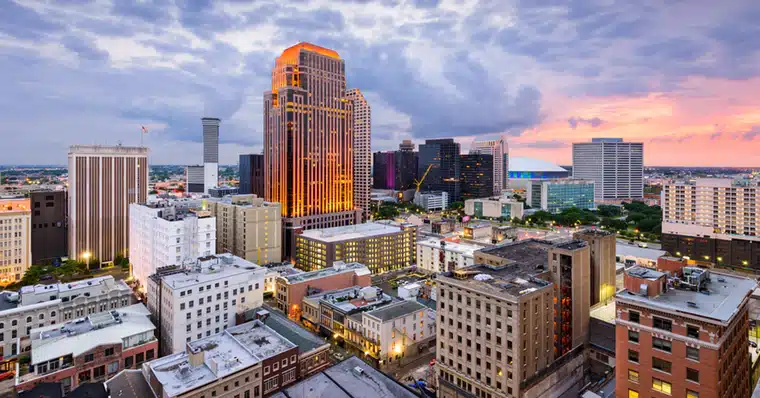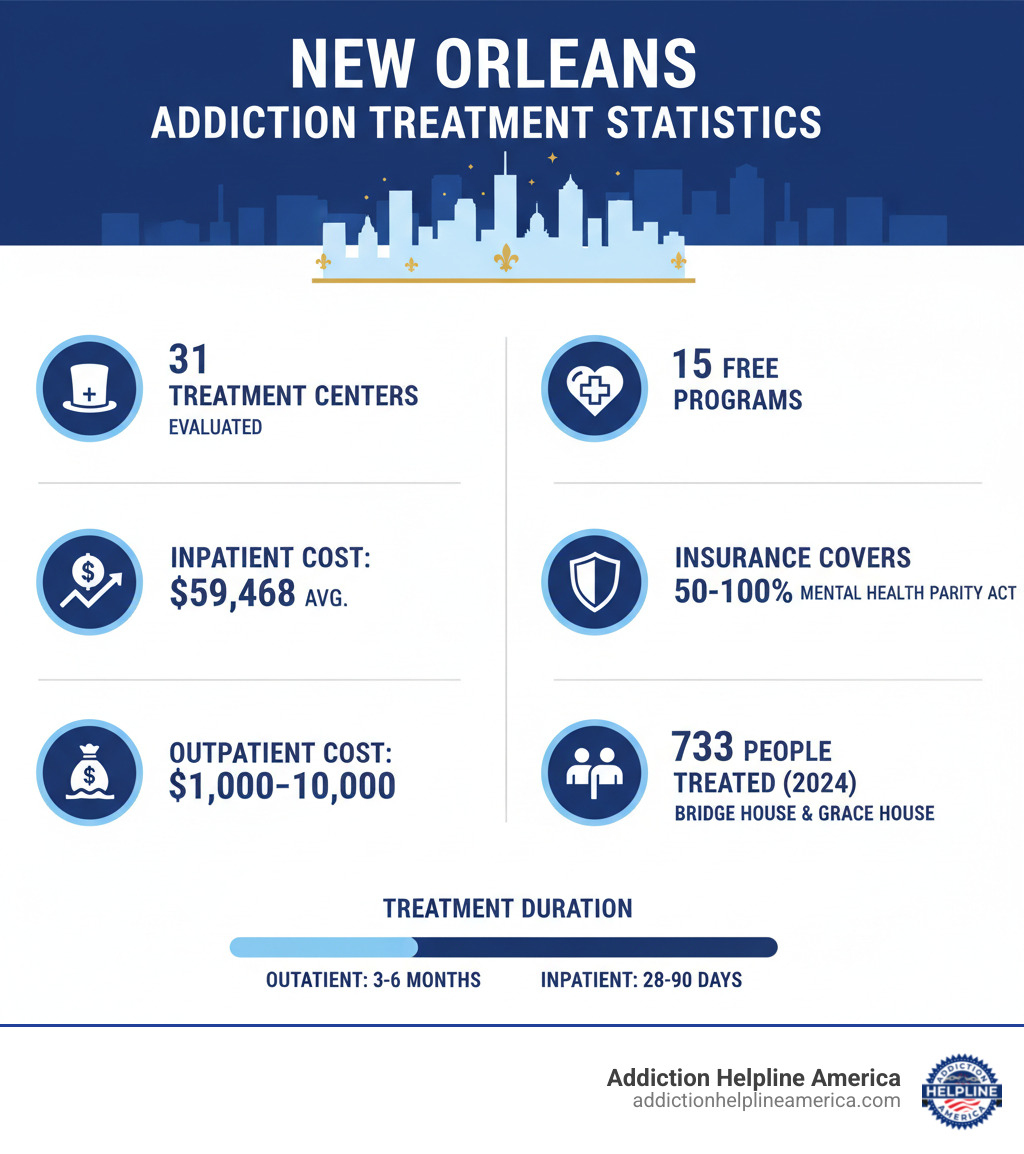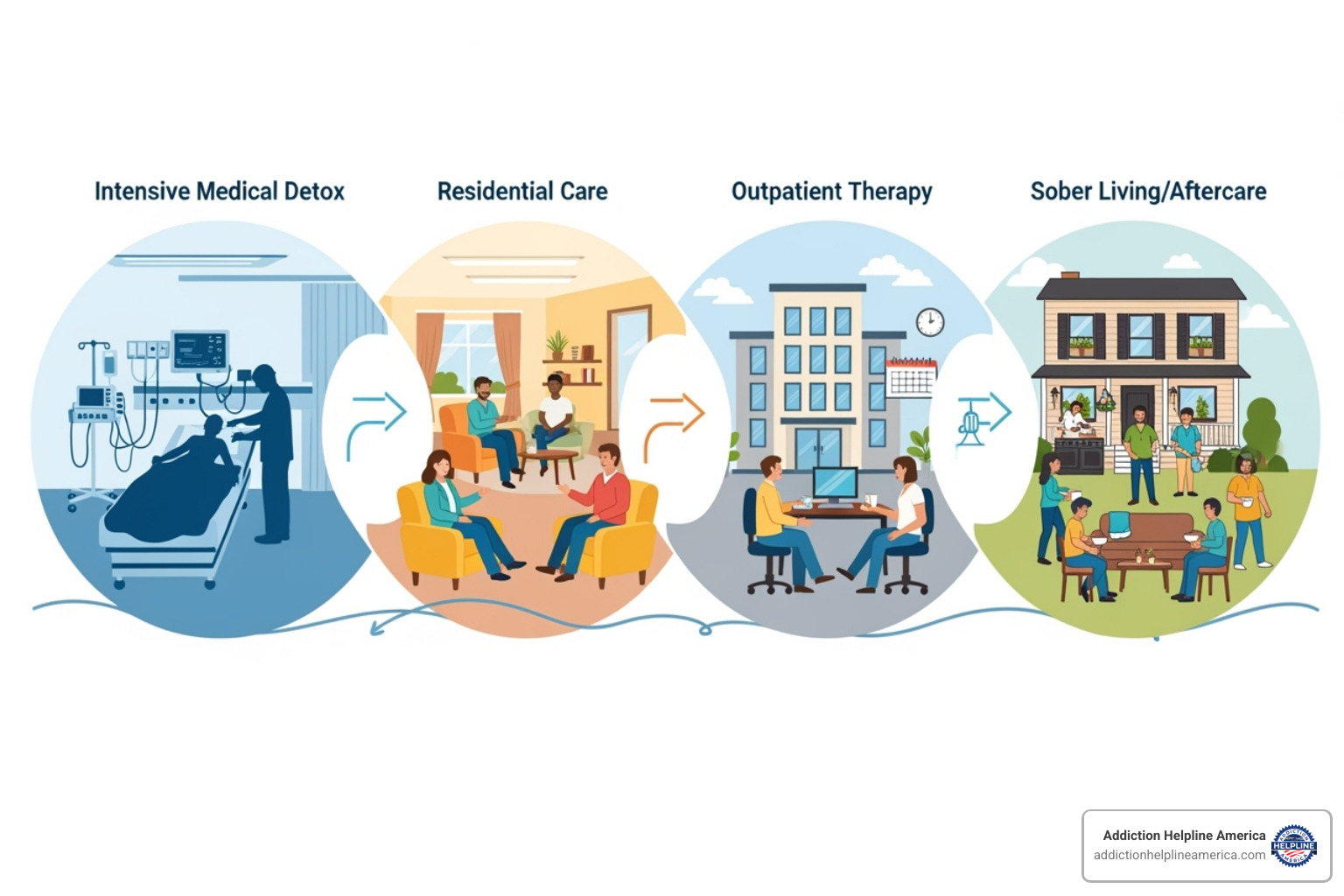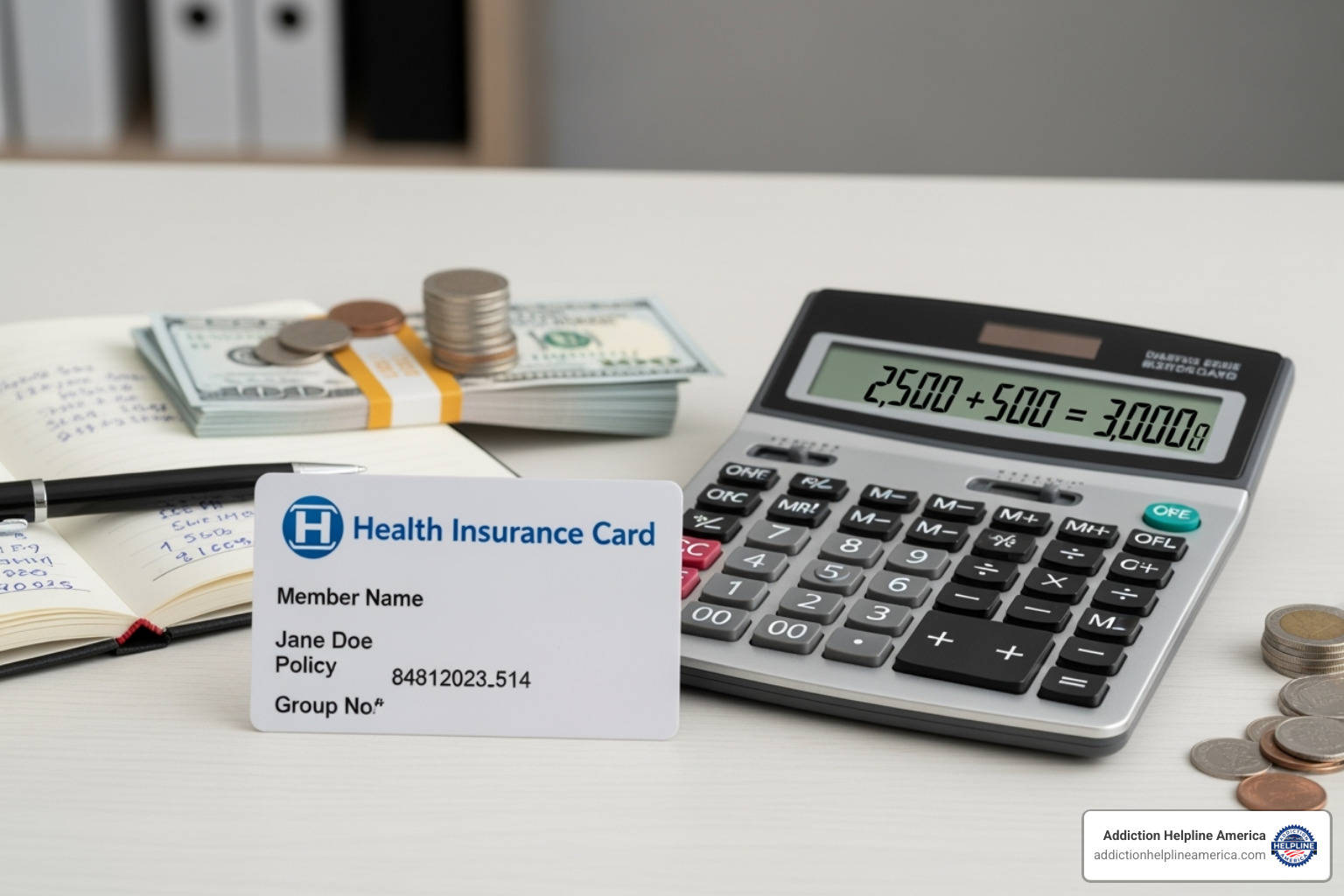
Finding Help for Addiction in New Orleans: Your Path to Recovery Starts Here
Rehab in New Orleans offers a diverse landscape of treatment options, from no-cost residential programs to luxury facilities. Understanding your options is the first step toward recovery for yourself or a loved one.
Quick Overview of Rehab Options in New Orleans:
- Cost Range: Outpatient programs: $1,000-$10,000 | Inpatient programs: $5,000-$50,000
- No-Cost Options: Bridge House (men), Grace House (women), state-funded facilities
- Levels of Care: Medical detox, residential inpatient, partial hospitalization (PHP), intensive outpatient (IOP), standard outpatient, sober living
- Insurance Coverage: Most major insurers accepted; Mental Health Parity Act requires coverage similar to physical health conditions
- Payment Assistance: Medicaid/Medicare, sliding scale fees, grants, scholarships, payment plans
New Orleans is home to over 15 evaluated treatment centers serving thousands of people monthly. The city offers everything from medical detox and 28-day residential programs to long-term recovery housing. Many facilities specialize in dual diagnosis treatment for co-occurring mental health conditions like anxiety, depression, and trauma.
If you’re feeling overwhelmed, you’re not alone. Organizations like Bridge House / Grace House have served the New Orleans community for over 65 years, treating hundreds of men and women annually through their no-cost programs. As one client shared: “Odyssey House changed my life. Odyssey house saved my life.”
At Addiction Helpline America, we connect individuals with quality rehab in New Orleans. Our team provides confidential, personalized treatment referrals 24/7. We can help you steer your options based on your needs, insurance, and circumstances.

Understanding the Landscape of Rehab in New Orleans
When looking for rehab in New Orleans, you’ll find that treatment is a continuum of care—a journey through different programs as your needs change.
Medical detox is often the first step. For substances like alcohol, opioids, or benzodiazepines, stopping suddenly can be dangerous. Medical detox provides 24/7 medical supervision to manage withdrawal symptoms safely and make the process as comfortable as possible.
Next, inpatient residential treatment offers immersive support. You live at the facility for 28 to 90 days, removed from daily triggers to focus on healing through individual and group therapy, workshops, and other structured activities.
A Partial Hospitalization Program (PHP), or “day treatment,” is a step down. It provides intensive therapy during the day, five to seven days a week, while you return home or to a sober living residence at night.
Intensive Outpatient Programs (IOP) offer more flexibility, with therapy sessions several times a week, often in the evenings. This allows you to continue with work, school, or family duties while receiving consistent support.
Standard outpatient treatment is the least intensive option, involving weekly therapy sessions. It’s ideal for those with a strong support system who have already built a foundation in recovery.
Sober living homes provide a substance-free, structured environment where residents support each other in recovery, bridging the gap between intensive treatment and independent living.
Finally, quality programs include aftercare planning. Recovery is a lifelong commitment, and aftercare connects you with ongoing therapy, support groups, and community resources to maintain long-term sobriety.

What to Look for in a Rehab in New Orleans
Choosing the right rehab in New Orleans is easier when you focus on key quality indicators.
Accreditation is a crucial sign of quality. Look for facilities accredited by organizations like CARF International or The Joint Commission. This means the center meets high standards for care and safety. Also, ensure the facility has proper state licensure.
Effective treatment centers use evidence-based therapies—scientifically proven approaches like cognitive behavioral therapy (CBT), dialectical behavior therapy (DBT), and motivational interviewing (MI). For opioid or alcohol dependence, medication-assisted treatment (MAT) may be used.
Your treatment should be personal. Quality centers create individualized treatment plans custom to your unique history, needs, and goals. Your plan should reflect your personal story.
Finally, check staff qualifications. The clinical team should include licensed therapists, certified addiction counselors, and medical professionals who specialize in addiction and mental health.
For a broader look at what’s available across the state, check out our guide on Louisiana treatment options.
The Importance of Dual Diagnosis Treatment
Addiction often co-occurs with mental health conditions like anxiety, depression, or PTSD. This is known as a dual diagnosis or co-occurring disorders.
Substance use can be a way to self-medicate emotional pain, or it can worsen mental health issues, creating a vicious cycle. Treating only the addiction while ignoring the underlying mental health condition is often ineffective long-term.
That’s why effective rehab in New Orleans offers integrated treatment, addressing both substance use and mental health simultaneously. This is especially important for individuals with a history of trauma, as unaddressed trauma can sabotage recovery. When both your addiction and your mental health receive professional care together, your chances of lasting recovery improve dramatically.
For more scientific information about this critical connection, explore the research on co-occurring disorders from the National Institute of Mental Health.
The Cost of Addiction Treatment and Payment Options
The cost of rehab can feel overwhelming, but it should never stop you from getting help. Many payment options are available to make treatment accessible.
The cost of rehab in New Orleans varies based on the program. Outpatient programs typically range from $1,000 to $10,000, while inpatient residential treatment can run from $5,000 to $50,000. The average cost for treatment in New Orleans is around $59,468, which is in line with state and national averages.
Factors influencing the price include the level of amenities, program duration, and the level of care required. Medical detox and 24/7 residential care cost more than outpatient therapy due to higher staffing and resource needs.
Fortunately, insurance can significantly reduce out-of-pocket costs. The Mental Health Parity and Addiction Equity Act requires most health insurance plans to cover substance use disorder treatment similarly to other medical conditions. Your insurance plan is a key tool for accessing this care.

How to Pay for Rehab in New Orleans
Let’s walk through your payment options.
Private insurance is a common starting point. Major providers like Blue Cross Blue Shield, Aetna, Cigna, and UnitedHealthcare offer substantial coverage. At Addiction Helpline America, we can verify your benefits for you, removing that stress from your plate.
Medicaid and Medicare are government-funded programs that provide a crucial safety net for those with limited income or who are over 65. Many New Orleans rehab centers accept both.
State-funded programs in Louisiana are designed for residents without insurance or income, offering free or very low-cost treatment.
Some facilities offer sliding scale fees, adjusting costs based on your income. Others provide grants and scholarships or allow you to set up payment plans. The key is to ask questions and explore every avenue.
Finding Low-Cost and Free Rehab in New Orleans
Everyone deserves a chance at recovery, regardless of their financial situation. New Orleans has excellent options for affordable treatment.
State-funded facilities and non-profit organizations are the primary resources for free or low-cost care. With help from state and federal grants, many centers provide detox, inpatient, and outpatient services at little to no charge. For example, Bridge House and Grace House have offered no-cost residential treatment for over 65 years, serving hundreds of men and women annually.
These programs prioritize individuals who are homeless, uninsured, or have low incomes. Faith-based programs also offer another path, often providing minimal-cost or free services that integrate spiritual principles into recovery.
Eligibility typically depends on financial need and Louisiana residency. You may need to provide proof of income, residency, and insurance status. Navigating these options can be challenging, but you don’t have to do it alone.
At Addiction Helpline America, we’ve helped countless people find treatment that fits their financial situation. We’re here to help you find a path forward, regardless of what’s in your bank account.
Top 10 Rated Addiction Treatment Centers in New Orleans
Finding the “best” rehab is a personal decision, but our team has evaluated over 15 facilities in New Orleans to help guide you. We’ve assessed treatment quality, services offered, and client feedback to identify some of the strongest options available.

We believe these centers for rehab in New Orleans represent excellent choices, each offering a unique approach to recovery.
Bridge House / Grace House: A Legacy of Hope
Serving the New Orleans community for over 65 years, Bridge House (for men) and Grace House (for women) are institutions of hope. They provide no-cost, long-term residential treatment to individuals without the resources for private care. Their CARF-accredited programs include group therapy, 12-Step programming, and vocational training to help clients rebuild their lives. They also prioritize admission for pregnant women, ensuring they get immediate care.
Odyssey House Louisiana (OHL): A Full Continuum of Care
As a non-profit behavioral healthcare provider, Odyssey House Louisiana offers a true continuum of care. OHL serves over 2,000 people each month with services including medically supported detox, an intensive inpatient program, and an Intensive Outpatient Program (IOP). OHL also provides a Sobering Center, a low-barrier shelter, and housing assistance, addressing the interconnected issues of addiction, housing, and healthcare. As one client said, “Odyssey House saved my life.”
NOLA Detox & Recovery Center: Clinically Advanced Care
NOLA Detox & Recovery Center has quickly earned its reputation as a top-tier option, even being voted #1 Addiction Treatment in “Best of New Orleans.” Founded by individuals with personal experience in recovery, the center offers a full spectrum of care, including medical detox, an inpatient residential program, extended care, and step-down programs like PHP and IOP. Their philosophy centers on evidence-based treatment and personalized recovery paths. Their residential treatment center is located at 4201 Woodland Drive New Orleans, LA 70131.
Other Leading Facilities in the Greater New Orleans Area
The Greater New Orleans area has many other accredited and highly-rated providers. At Addiction Helpline America, we partner with a wide network of facilities to connect you with the best fit for your situation.
- River Oaks Hospital offers dual diagnosis programs and acute behavioral health services.
- Longbranch Recovery and Wellness is known for personalized, 12-step-based treatment plans.
- Imagine Recovery integrates mindfulness, art, and music into its outpatient care.
- Integrity Behavioral Management provides client-centered, trauma-informed outpatient and IOP services.
- Townsend Recovery Detox and Drug Rehab Center offers medical stabilization and residential treatment.
These centers, along with others in our network like the New Orleans Center for Hope and Change, offer a variety of holistic and evidence-based approaches for adults, young adults, and families.
Finding the Right Program and Support Resources
You’ve learned about the different types of care and facilities for rehab in New Orleans. Now, how do you find the right one? This step can feel overwhelming, but you don’t have to do it alone.

Start with an honest self-assessment. What substances are involved? Are there co-occurring mental health challenges? A clinical evaluation from a professional can provide clarity and recommend the appropriate level of care.
When contacting potential facilities, ask the right questions. Inquire about the therapies they offer (CBT, DBT, family therapy), staff qualifications, and how they create individualized treatment plans. Also ask about program duration and family involvement, as addiction affects the entire family system. Finally, ask about aftercare and ongoing support to ensure a solid plan for long-term recovery.
At Addiction Helpline America, this is what we do. We provide confidential, personalized guidance to help you steer these decisions. Our team understands the New Orleans treatment landscape and can connect you with facilities that match your needs. We’ll help you verify insurance, understand costs, and find the right fit from our network, including our New Orleans Center for Hope and Change.
Local and National Support Groups
Formal treatment is essential, but peer support groups are the backbone of long-term recovery. They offer understanding from others who have walked the same path.
- Twelve-step programs like Alcoholics Anonymous (AA) and Narcotics Anonymous (NA) are widely available. Find local meetings through New Orleans Area Alcoholics Anonymous and New Orleans Area of Narcotics Anonymous.
- Alternatives like SMART Recovery use cognitive-behavioral techniques for self-empowerment. Find meetings through their meeting finder.
- NAMI New Orleans (National Alliance on Mental Illness) provides support and education for individuals and families affected by mental illness and co-occurring substance use. Connect with them at NAMI New Orleans.
National Helplines and Resources
When you need to talk to someone right now, it can be hard to know where to turn. Instead of searching through confusing directories and government websites, you can make one call.
Addiction Helpline America is a free, confidential resource available 24/7. Our specialists are here to provide information, listen to your story, and connect you with the right local treatment facilities, support groups, and community-based organizations in the New Orleans area.
Reaching out to us is a direct and simple way to get the personalized guidance you need. We exist to help you steer your options and take the first step toward recovery without the stress of figuring it all out on your own.
Frequently Asked Questions about Addiction Treatment
We hear certain questions again and again from people considering rehab in New Orleans. Here are some straightforward answers.
How long does rehab treatment take?
There’s no universal timeline for treatment. The duration depends on your specific needs, the severity of the addiction, and the level of care required.
- Inpatient programs typically last 30, 60, or 90 days, with some long-term options extending for several months.
- Outpatient programs are more flexible, with IOP often lasting 3 to 6 months and standard care continuing as needed.
Aftercare is crucial for long-term success. Most people continue with therapy or support groups for years after their initial program. The best program length is whatever gives you the tools for lasting recovery.
Will I lose my job if I go to rehab?
This is a common fear, but federal laws offer protection. Generally, you cannot be fired for seeking addiction treatment.
- The Americans with Disabilities Act (ADA) protects individuals in rehab from workplace discrimination.
- The Family and Medical Leave Act (FMLA) allows eligible employees to take up to 12 weeks of unpaid, job-protected leave for substance abuse treatment.
Many companies also offer Employee Assistance Programs (EAP) for confidential counseling and referrals. Most residential facilities require you to disconnect from work to focus fully on your healing, which leads to better outcomes. Talk with your HR department or an EAP counselor to understand your rights.
Do I need to detox before starting rehab?
For many people, yes—medical detox is an essential first step. Withdrawal from certain substances, especially alcohol and benzodiazepines, can be dangerous and even life-threatening without medical supervision.
Medical detox provides a safe environment where healthcare professionals monitor you 24/7. They can administer medications to ease withdrawal symptoms and manage any complications. If you experience uncomfortable symptoms when you try to stop using, you should seek help at an inpatient medical detox center. Don’t try to do it alone at home.
Not everyone requires a full medical detox. A clinical assessment can determine the appropriate first step for your situation. At Addiction Helpline America, we can connect you with detox facilities in New Orleans and help you understand what level of care is right for you. Your safety is always the top priority.
Conclusion
The journey to recovery is personal, but you don’t have to walk it alone. New Orleans offers a rich and diverse landscape for rehab, from the no-cost services at Bridge House / Grace House to the comprehensive care at Odyssey House Louisiana and the clinical programs at NOLA Detox & Recovery Center.
This guide has covered the different levels of care, treatment costs, payment options, and the importance of finding an accredited program that offers individualized, dual-diagnosis care. We hope it has shown you that solutions exist, whether you’re concerned about affordability, program type, or taking time off work.
The Greater New Orleans area is home to many quality treatment centers, and taking the first step to reach out is the most courageous act you can make. We’ve seen countless individuals transform their lives, and we believe you can too.
At Addiction Helpline America, we are dedicated to connecting people to addiction and mental health treatment. Our mission is to provide free, confidential, and personalized guidance to help you find the right recovery program from our vast network. We understand the challenges of seeking help in the New Orleans area and are here to guide you based on your specific needs and circumstances.
Don’t let uncertainty or fear hold you back. Recovery is possible, and it starts with a single step forward.
Find personalized alcohol and drug addiction treatment in New Orleans today
Our helpline is 100%
free & confidential
If you or someone you care about is struggling with drug or alcohol addiction, we can help you explore your recovery options. Don’t face this challenge alone—seek support from us.
Programs
Resources
Will my insurance
cover addiction
treatment?
We're ready to help
Find the best
drug or alcohol treatment
center
Are you or a loved one struggling with addiction? Call today to speak to a treatment expert.












